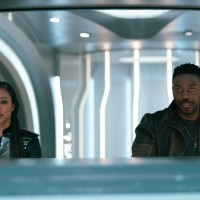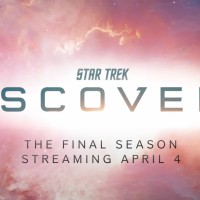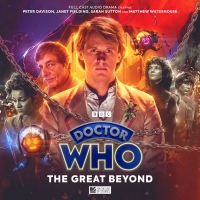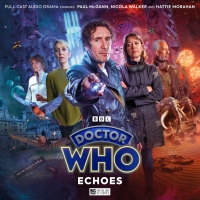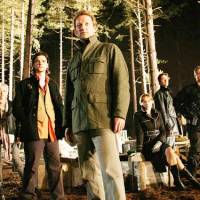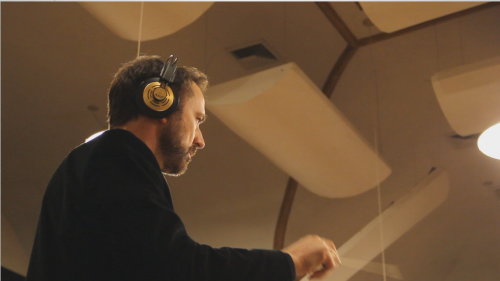 American composer Chance Thomas is best known for his award-winning original music scores for blockbuster videos games. He also composes for film, animation, television and virtual reality.
American composer Chance Thomas is best known for his award-winning original music scores for blockbuster videos games. He also composes for film, animation, television and virtual reality.
Thomas has been entrusted with prestigious titles and high-value entertainment properties throughout his career – including The Lord of the Rings, Marvel, Avatar, Dungeons & Dragons, and King Kong. His movie and TV scores include an Oscar winning film (The ChubbChubbs), an Emmy-winning PSA Emmy-nominated TV movie (Lost Treasure Hunt) and music for popular shows like The Bachelorette, Pawn Stars, The Daily Show and America’s Most Wanted.
In the late 1990s he led a successful movement which brought game music into the Grammy Awards for the first time. He helped found the Game Audio Network Guild and is a former Chair of the Music and Sound Peer Committees for the Academy of Interactive Arts and Sciences.
He is best known for his compositions for The Lord of the Rings Online, and with a double-CD just released to mark its 10 years, Thomas chatted with Paul Simpson about all things hobbit…
 How were you first attracted to The Lord of the Rings?
How were you first attracted to The Lord of the Rings?
As a fan of literature, I was attracted to it because at the time it was – and it may still be – the richest, most expressive and accessible fantasy world I had ever encountered, and I love fantasy. It’s my fiction of choice. I love fantasy worlds and science fiction.
As a composer, I was instantly attracted to it because of the breadth and depth of the canvas – what a fabulous playground to dive into musically!
Were those thoughts going through your mind when you first read the books, or were you just caught up in the words and the tale?
The first time through was very much just about the tale, because I was approaching it recreationally. But when I came back to it as a composer, it was very methodical, very analytical, going through page by page, chapter by chapter, race by race, trying to figure out: how does music fit into this world? How would music best reflect this world? And how can I use music as a tool to draw people more deeply into the world?
How were you approached to compose for it?
I was working in the mid-90s for a videogame company in California called Sierra Online, and I had just finished a big adventure game called Quest for Glory. The general manager of our facility had just secured a licence to build an online massively multiplayer game based on The Lord of the Rings, and there were many composers at his beck and call, obviously. I fought pretty hard to be the guy who would go in and do the music for that game.
 So was that original game purely the narrative of the story, or was it building the world out?
So was that original game purely the narrative of the story, or was it building the world out?
The goal was to build the world out as a giant Middle-earth sandbox. The players could come in and do what they wanted in that world. Unfortunately the game ran out of funding and never made it to the light of day. The licence was purchased by another company who started work on Tolkien-based games which was then purchased by another company… and eventually I caught back up to the licence and have been merrily creating music for Middle-earth ever since.
How far did you get with researching with that original licensee?
Most of my research started with the Sierra project as I began to experiment with writing a little bit of music based on how I was interpreting the research. Honestly, most of those early efforts were pretty miserable. We had a few ugly prototypes.
But through that process I learned that what might work intellectually, what might work conceptually. I learned that what might be a good match conceptually did not always translate to something that was musically desirable and enticing.
Through that early process with the first licence, which thankfully never made it to market, I made my mistakes and figured out, “we don’t want to go quite so far in that direction”, “we don’t want to go quite so far in the other direction”. Having made those errors on the early project, I was then in a better position to hit closer to a good bullseye.
You talk about errors conceptually – does that come from the fact that Tolkien wasn’t writing a musical; he was creating a world in which music played a part? He certainly had an interest in the music – he collaborated with Donald Swann on the song cycle The Road Goes Ever On – but Swann said Tolkien didn’t necessarily understand all the musical elements. By trying to base it on what he wrote, are you not starting from a false premise?
 What you’ve brought up is a really interesting point that most people don’t think about – but this is how I approached it when I first dove in. Consider this passage from The Silmarillion which sets a tone of aesthetic beauty and artistry at the highest possible level.
What you’ve brought up is a really interesting point that most people don’t think about – but this is how I approached it when I first dove in. Consider this passage from The Silmarillion which sets a tone of aesthetic beauty and artistry at the highest possible level.
Then the voices of the Ainur, like unto harps and lutes, and pipes and trumpets, and viols and organs, and like unto countless choirs singing with words, began to fashion the theme of Iluvatar to a great music; and a sound arose of endless interchanging melodies woven in harmony that passed beyond hearing into the depths and into the heights, and the places of the dwelling of Iluvatar were filled to overflowing, and the music and the echo of the music went out into the Void, and it was not void.
Tolkien gives us this glorious conceptual premise that music is an all-powerful, all-encompassing voice and expression of the divine. But getting down to the nuts and bolts of it, he doesn’t really spell out every detail. Like you say, he wasn’t creating a musical, he was building a world, and so he threw this great ideal out there.
As I went through the books, I did find little bits and pieces where you could tell that he was talking about certain types of instruments that are a good fit for a certain race. Then you infer from what he lists specifically, and you create a little bit of a skeleton; then you infer the joints and ligaments, and you infer some musculature; and then from that you infer skin tone and colour and shape, those kinds of things.
What I tried to do was be vigorously authentic to the few little specific bits that he gives us, and then take the glorious vision that he had about music, and between those two extremes fill in the details.
There are various passages – both in the Biblical Book of Psalms and the Book of Revelations – that are very similar to the passage you quote from The Silmarillion…
You could do worse than follow David in the Old Testament at the height of Israel’s glory in those days!
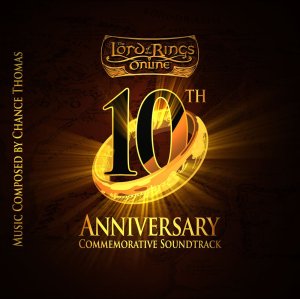 In terms of putting the musculature and the ligaments etc. into it, you’ve used a lot of different instruments, and not necessarily the ones that you might assume (as you’ve commented, “they didn’t have marimbas in the Shire”). Where did you get the inspiration for those for your Style Guide? How do you translate the music of the Shire into our terms?
In terms of putting the musculature and the ligaments etc. into it, you’ve used a lot of different instruments, and not necessarily the ones that you might assume (as you’ve commented, “they didn’t have marimbas in the Shire”). Where did you get the inspiration for those for your Style Guide? How do you translate the music of the Shire into our terms?
A few things I pulled from the literature – like the fiddle and the “little drums”. So how did I interpret that? I interpreted that as a bodhran – a hand drum. Tolkien talked about “pipes and flutes” – so do I interpret that as a C flute or a bass flute? No, I interpret that as an Irish flute or a penny whistle.
You have a few references and then you infer how to interpret those references – at least that’s how I approached it. I think most composers who are working on a fiction like this would do a similar kind of thing.
Let’s talk about hobbits: how would a hobbit sound? How would a hobbit singing sound? I went through and I read situations where you had the hobbits dancing in the tavern, singing and I would infer from descriptions like “ruddy complexion” and “hairy feet”… they’re probably a little bit raspy, they’re probably merry, they’re probably baritones and altos.
You take what he gives you and based on the language of music and the language of music scoring, as a composer you make an inference and an interpretation. And then certain sounds, certain instruments, certain ranges conjure up ideas in us because there is a language of music scoring that most of us who grew up in the Western world understand intuitively. So when we get it right, and I play a piece of music like Hills of the Shire or Party in the Shire to someone, they say, “That sounds like hobbits to me” – then bingo! You know you’ve nailed it.
 What’s the area that you’ve found most challenging?
What’s the area that you’ve found most challenging?
The elves were hard for me. The elves were really challenging at the beginning because they’re portrayed as very graceful, very elegant, almost angelically so – it would be a little bit like, how do you score an angel? There’s a purity to angels, an extreme level of refinement, but there’s also always this profound power and strength – and often in music we tend to describe strength with loudness and bass and big bombastic kinds of sounds, but putting those together was hard.
I still don’t know if I’ve ever really completely nailed it. If you listen to a song called Ages of the Golden Wood (cut 4 on the LOTRO tin), that’s the closest I think I ever got – you’ve got the harps, the voice, the interesting chord changes, and then this profound bass, and there’s a strength in the harmonies and the harmonic changes. That’s the closest I ever got to nailing the elves, but even that I’m not sure it’s 100 percent. That’s the one I struggled with the most.
 Is the double album freshly recorded material?
Is the double album freshly recorded material?
It’s the music that I’ve recorded over the past ten years, so they are the original recordings. Many of them have a sheen of mastering, several of them are edited, and I just sweated over getting it into the right order so you could literally listen to the full two hours of music and feel like you had been through on a wonderful journey across Middle-earth.
Is everything acoustic, or is there sampling in there as well?
It is overwhelmingly acoustic; there’s something about recording a classically trained musician pouring their training and their passion and their interpretation into a fine acoustic instrument in a beautiful hall that you just can’t get from a keyboard!
On the other hand, most of my percussion is sampled, and there are a few action pieces where I supplement the live orchestra with some sampled elements just to beef it up a little bit. If you were to pin me down to a percentage I would say that 87.65 percent of it is live acoustic. Roughly!
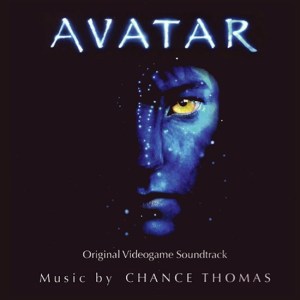 What prompted you to become a composer?
What prompted you to become a composer?
I’ve had music trying to spring out of me since I was a kid. When I was probably 10, I started writing songs; I think I entered my first national song-writing contest when I was 12 – my mom had to sign for it! – and I got in a rock band in high school and was probably the most prolific songwriter in the group.
I also love to listen to music – one of my favourite things is to put the headphones on and listen to a great album for an hour or two. When I was a little kid I had a record player and I would put a record on, then put the two speakers on the floor and lay down between them and just soak up every colour, every little rhythmic spike, the arrangements and the melodies and the harmonies and the rhythms. I just love, love music.
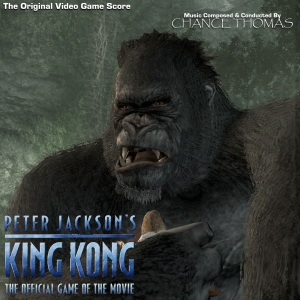 What do you love most about composing?
What do you love most about composing?
What I love most is to dive into a rich world and explore it: explore it in my imagination, explore it in my intellect and then explore it as a composer. For example, when I got the chance to do the video game score for Peter Jackson’s King Kong several years ago, that was a glorious experience for me. I researched all the early King Kong iterations – the Max Steiner score, even the John Barry score for the Jessica Lange movie. I dove into those, and I had the development team from Montpelier, France, send me hundreds of screen shots from the game, and art that the WETA team had developed for the film. I just plastered my studio with images from Skull Island.
I lived there, I lived on Skull Island for several weeks – and I loved it, and because it was a deep and rich and very detailed drawn world, I could deliver a lot with the music. The same thing happened when I did Avatar for Jim Cameron’s team – I was living in Pandora. These visionary people like JRR Tolkien and Peter Jackson and Jim Cameron, there is a depth and detail orientation to their imagination that is incredibly inspiring.
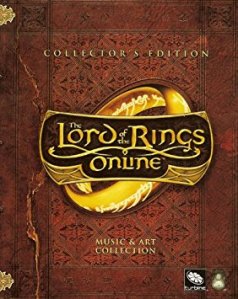 Looking back at the whole project, what has surprised you most?
Looking back at the whole project, what has surprised you most?
The biggest surprise has definitely come from the players of the game and their attachment to some of this music.
A few years ago when Warner Bros. still held the licence for the online game, they made some budgetary decisions that precluded me from being able to work on the game any more and literally a group of players went out to change.org and created a petition to bring me back. That was so touching – I couldn’t believe that.
The passion that some of the players expressed for the music in the game and how it added a new dimension to their experience… that has been by far the most surprising, and frankly the most rewarding aspect of the whole project.
You can preview the LOTRO 10 double album for free, and purchase it if you like, by visiting: www.HUGEsoundRecords.com/lotro10
Thanks to Molly McIsaac and Adrianna Perez for their help in arranging this interview.



